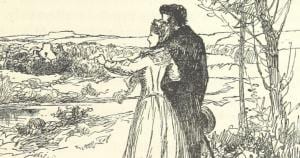I  am sorry.
am sorry.
Why?
I loved being in love, but my ideas about love as a youngling were harmful.
Lord Jesus Christ, son of God, have mercy on me a sinner.
God used His servant, Charlotte Bronte, to educate me. Jane Eyre is the Christian romantic novel: structured from Genesis (Jane born in the ‘red room’) to Revelation (‘Amen; even so come, Lord Jesus!’ is the last line).
Jane Eyre reminds us that the “super-Christian,” the one that blusters about holiness continuously, while kowtowing to money, is an enemy to genuine Christian love. The truth matters less than that younglings give right answers. Here child Jane faces the “Christian educator” Mr.Brocklehurst;
“Do you read your Bible?” “Sometimes.” “With pleasure? Are you fond of it?” “I like Revelations, and the book of Daniel, and Genesis and Samuel, and a little bit of Exodus, and some parts of Kings and Chronicles, and Job and Jonah.” “And the Psalms? I hope you like them?” “No, sir.” “No? oh, shocking! I have a little boy, younger than you, who knows six Psalms by heart: and when you ask him which he would rather have, a gingerbread-nut to eat or a verse of a Psalm to learn, he says: ‘Oh! the verse of a Psalm! angels sing Psalms;’ says he, ‘I wish to be a little angel here below;’ he then gets two nuts in recompense for his infant piety.”
This is a summary judgement of false education more concerned with treats won than honest answers.
Bronte knows there is no love in mere conformity. Honesty is not merely the best policy, but the only basis for comity.
The nonconformist can be merely a . . . Jerk. All sin. All fall short of the glory of God. Honesty must be combined with mercy and forgiveness, the mightiest sword:
Life appears to me too short to be spent in nursing animosity or registering wrongs. We are, and must be, one and all, burdened with faults in this world: but the time will soon come when, I trust, we shall put them off in putting off our corruptible bodies; when debasement and sin will fall from us with this cumbrous frame of flesh, and only the spark of the spirit will remain,—the impalpable principle of light and thought, pure as when it left the Creator to inspire the creature: whence it came it will return; perhaps again to be communicated to some being higher than man—perhaps to pass through gradations of glory, from the pale human soul to brighten to the seraph!
Bronte reveals the Gospel is true: love needs grace.
Still this grace, this message of the Gospel, can, in the hands of the Brocklehurst, the hypocrite, become a new law, a greater bondage. Liberty is necessary for love.
I desired liberty; for liberty I gasped; for liberty I uttered a prayer; it seemed scattered on the wind then faintly blowing.
Love always sets a person free. Love is based on consent, the liberty of equals. This is so true that I forgot that this side of Paradise liberty must be balanced by virtue. My impulse to love needed (needs!) the guidance of God’s moral law:
But, then, a voice within me averred that I could do it and foretold that I should do it. I wrestled with my own resolution: I wanted to be weak that I might avoid the awful passage of further suffering I saw laid out for me; and Conscience, turned tyrant, held Passion by the throat, told her tauntingly, she had yet but dipped her dainty foot in the slough, and swore that with that arm of iron he would thrust her down to unsounded depths of agony.
Jane Eyre has love stronger than passion. She loves goodness, truth, and beauty more than any man. Love never breaks God’s law. God is love and so any love that would alienate Jane from God is not real love, but mere passion that produces slavery. Jane chooses love and liberty when she flees her lover and turns to God.
The law abiding, however, might make a different mistake. If we must, at times, sacrifice our earthly loves for the heavenly, then the lie might grow that earthly love is of no importance. We might think that we are the mules of paradise: beasts of burdens in this world so we can earn the world to come.
This is a lie, but the lie often comes from hallowed lips:
“You should hear himself on the subject. He has again and again explained that it is not himself, but his office he wishes to mate. He has told me I am formed for labour—not for love: which is true, no doubt. But, in my opinion, if I am not formed for love, it follows that I am not formed for marriage. Would it not be strange, Die, to be chained for life to a man who regarded one but as a useful tool?”
Pleasure is no sin and nobody is called to be a pack mule for Jesus. Nobody is formed for labor without love.
Jane is willing to go without a kind of love rather than pollute love. She does not confuse a grand passion with love, but she also does not mix up religious work with love. She looks for real love: holy, enduring, passionate.
Love never fails.
She endures and so is saved:
I know what it is to live entirely for and with what I love best on earth. I hold myself supremely blest—blest beyond what language can express; because I am my husband’s life as fully as he is mine. No woman was ever nearer to her mate than I am: ever more absolutely bone of his bone and flesh of his flesh. I know no weariness of my Edward’s society: he knows none of mine, any more than we each do of the pulsation of the heart that beats in our separate bosoms; consequently, we are ever together. To be together is for us to be at once as free as in solitude, as gay as in company. We talk, I believe, all day long: to talk to each other is but a more animated and an audible thinking. All my confidence is bestowed on him, all his confidence is devoted to me; we are precisely suited in character—perfect concord is the result.
And of course this happy ending in this life is not always given to each person. Sometimes we must be as happy as we can be, content with what is rather than what should have been, since what should have been cannot be .. . Yet.
Paradise is coming when all things will be rectified. Meanwhile we wait in hope.
Come Lord Jesus come and bring perfect love.
Thank you Charlotte Bronte.












